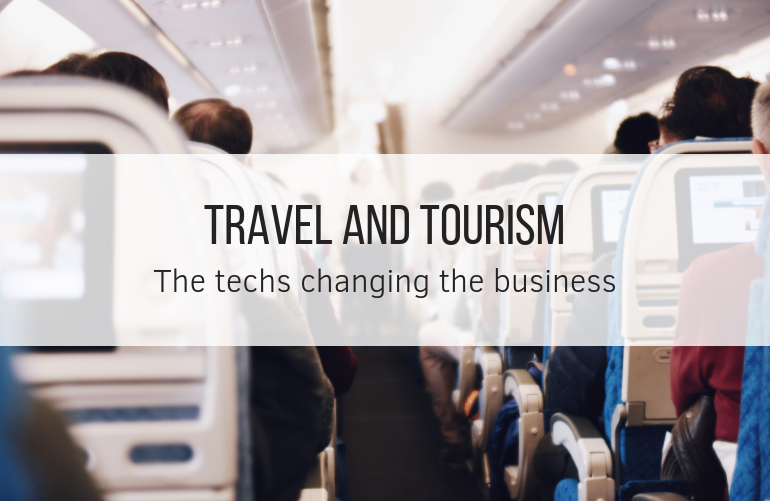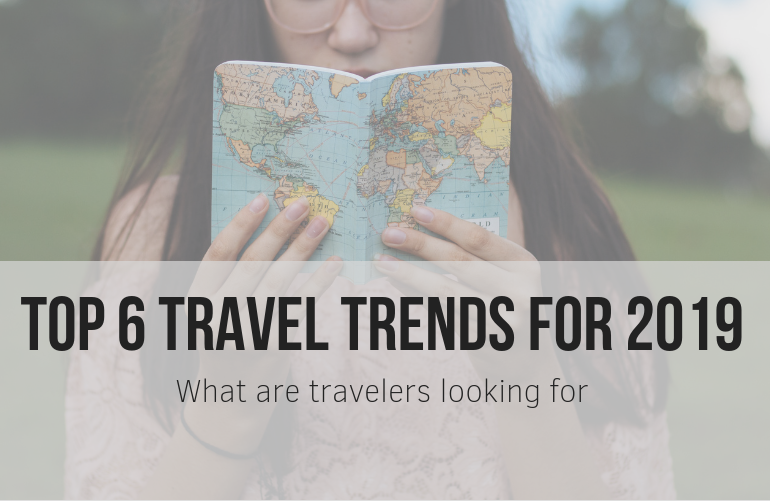
by silvia | Jan 21, 2019 | Corporates, Featured, Investors, Startups, Uncategorized
Are you wondering which techs will grow exponentially in 2019 and disrupt industries? Wait no more, scroll down and see the top 5 tech trends for 2019!
1. Blockchain beyond crypto

When we hear “blockchain”, we automatically think about cryptocurrency. Because it is the technology that enables cryptocurrencies like bitcoin, litecoin, ether, etc, the spotlight has been on it, but there are many use cases where the distributed ledger technology can be applied to improve business processes.
Blockchain is a secure system for recording and verifying transactions and storing trusted records and it has the potential to disrupt enterprises in many industries. Companies are using Blockchain technology to transform time-consuming, centralized, less reliable and less secure systems.
Finance is easily mentioned as the first industry that will be disrupted by blockchain, but there are other challenges that can be worked on with blockchain, like transparency of supply chains, the streamlining of processes and new sharing economies that can be useful to the food industry, the fashion industry, and even the energy sector.
2. Space is the new frontier (again)

If you’re a fan of JFK’s inspirational “Moon Speech”, you’ll be glad to know that the space run is about the enter the political agenda (again).
This year began with China landing on the dark side of the moon. And they probably won’t be the only ones. Besides Americans, there are moon missions also coming from India, Israel, and Japan.
Romantic, inspiring speeches are not guaranteed, but the investment in this field brings technological innovations that will then trickle down into other industries – we’re still reaping the benefits of the 60’s space run – we can thank it for artificial limbs, satellite TV, water purifier, freeze-dried food, and memory foam!
3. Wellness and Health get blurred

Beauty has been linked to health – healthy skin, hair, nails… – and beauty is ready to embrace technology to bring complete personalization to customers.
Beauty and skincare brands are using technological advances (like 3D face scanning and AI) to offer consumers completely tailored and unique recommendations and products for their skin’s needs.
A growing understanding of hormones’ role in every system of the body, affecting everything from your heart health to your sleep quality, is making for a boom in the market for home testing: which collects consumers data and then provides explained results and recommendations, with several consumers finding this option more affordable than traditional healthcare and opting to consult a doctor only after abnormal test results with the home kit.
Wellness aficionados are already using IV drips to boost their immune system, curing hangovers and boosting their skin with nutrients and vitamins, with several new locations offering these services.
All in all, with consumer’s knowledge improving and an explosion of wearables that will net us measure our own biometric data, treatments previously available only through doctor’s appointments are now being available directly to consumer’s, who are taking their health and well being into their own hands (thanks, Gwyneth Paltrow!).
4. Mobility continues to go green

The path to a greener city living will continue to flourish in 2019 (see what I did there?). Electrification will be reaching fleets of vehicles, like public transportation. Unlike individual electric car owners, public transportation has static routes and is predictable, and an infrastructure that is easy to build and plan for. Buses and trucks are also more polluting and have a long-term financial payoff for going electric – which makes them a perfect a perfect choice to “electrify”.
Also, governmental pushes to introduce more eco-friendly programmes, coupled with more electrical options – bikes and scooters -, and civic movements for sustainability and zero waste living will work towards a greener city living.
5. R+ gets to more apps and devices

Realities will get a big plus this year! Even though this is a technology that has been getting traction for some years now, only now are we realizing all its potential – and how to integrate it.
There is a value in taking the digital world and the physical world and bringing them together in meaningful ways. AR/VR will be used not only for gaming and entertainment purposes but also in everyday practical life.
It is already being used in education (to train doctors, nurses, teachers, and police officers) and it has a range of uses, from entertainment to commerce, from medicine to the military.
It will become even more interesting once it starts being connected with other input methods: combining things like eye tracking, voice recognition, hand gestures, finger bone tracking to create a truly immersive experience.
In 2019, enterprises will be expected to take advantage of its potential to lift efficiency or better communicate with its stakeholders.
Oh, and don’t forget to subscribe to our newsletter for more trends, tips, news and event details.

by silvia | Jan 20, 2019 | Corporates, Featured, Investors, Startups, Uncategorized
According to Gartner, traditional banks will be made irrelevant by 2030 due to changing customer behaviors and advancements in technology. As fintech startups fire up, the finance industry is set to be disrupted in the next few years.
Here are the 5 trends to watch in fintech in 2019:
1. Changes brought on by regulation

PSD2 (the European Payment Services Directive 2.0), set to be fully implemented in Europe by September 2019, will bring great advantages for consumers – it aims to make payments safer, increase customer’s protection and foster innovation and competition while ensuring a level playing field to all players.
But it will also mean a great deal of change for banks: to stay compliant, they will have to embrace digital transformation across their entire business and the opening up of their APIs to third parties.
This type of open banking will be on the rise (especially in Europe) as it provides greater financial transparency options for account holders ranging from open data to private data, which brings us to the next point.
2. Open Collaboration

Open banking will also bring to the financial industry into a smart collaboration mode. We’ll see multiple partnerships between banks, fintech startups, and other professional service providers (such as accountants and lawyers), all operating in an ecosystem via interconnected APIs. These partnerships will aim to deliver a consistent, seamless experience for end-users, and to provide a wider array of services.
3. Cashless Payments

Carrying a wallet with *gasp* coins inside is close to being a thing of the past!
We expect advancements in mobile and real-time payments – so banks should be thinking mobile first in their strategies.
We’ll also see stores running to get active chip machines just in time to jump on cardless payment train. Soon we’ll be using just phones for payments and all currency will virtually be, well, virtual.
4. Blockchain

It’s not surprising that blockchain will be one of the trends for the sector. But besides being the technology behind cryptocurrencies, there are a lot more ways blockchain will be helping the finance industry.
From cryptocurrencies to improved and faster payments, new banking solutions, trading opportunities, and the improvement of pretty much every industry, from health care to food production and retail, blockchains will soon be normality in our society.
5. Automation

People are not going to bank counters anymore, so not only are banks looking into mobile first solutions, but they are also looking for ways to substitute face-to-face interactions in their sales pipeline. Startups like Attila (from Lisbon Challenge by Beta-i’s Fall 18) are looking into AI to create meaningful financial conversations between clients and their banks.
But AI will not only help us streamline processes, but it will also help our decision-making: helping make on-the-spot decisions about where to put our money, what to do when an account is overdrawn, and approving us for loans and interest rates on the spot.

If you think you’ll be part of this revolution, you should be looking into making strategic partnerships. Join up with SIBS, the most secure, modern, and reliable payment solutions player, who has a network of more than 300 million users. SIBS Payforward Accelerator, the fintech and payment piloting program is back and looking for startups with solutions in Artificial Intelligence, Cyber Security, Blockchain, Big Data, Machine to Machine, Biometrics, Robotics, IoT as well as Open Banking API. Be part of the finance disruption, here.

by silvia | Dec 10, 2018 | Corporates, Featured, Investors, Startups
As much as we say Christmas is not about presents (and it isn’t!), we all love to receive and give really awesome presents.
According to psychologists, gift giving has rewards on both sides: not only the person who receives it is happy, but also, giving a gift releases endorphins to your brain that make you feel good.
A thoughtful, beautiful gift can show that we really thought about the person and strengthen the bond between the two. In the end, we love to see our friends and family smiling, and we feel good knowing we’ve taken care of someone.
So, if you are going to gift-give this Christmas, we have some suggestions you might want to look into. They are all from Portuguese startups and small businesses, so you’ll be giving awesome gifts and also supporting the local economy. Yeah!
At-home beauty treatment
We all love to pamper ourselves, and the convenience of having it without leaving the house cannot be surpassed. Except if we are also contributing to a good cause!

You can give all this with Sparkl! The company delivers beauty on demand – you can request hair styling, make-up and other beauty services delivered directly to your door. And by gifting one Sparkl Voucher Gift this Christmas, you’ll also be supporting Projecto Cabelos Mágicos – they create hats inspired by characters from kids’ imaginarium, and gift them to children going through chemotherapy.
Never lose anything
We all have that distracted friend that keeps forgetting everything and losing half of his possessions in a night. For them, the perfect gift is a Lapa.

These small devices can be attached to your phone, keys, wallet, laptop, bike – you name it! You can track their location through the app, and you can even set alarms for Lapa to warn you in case you forgot your wallet or passport at home (no more airport stress!).
Charged up!
If you have a super techie colleague or family member who has one thousand devices to charge and hogs all the wall plugs in the room, here’s a gift that will help both of you: Egg Electronics has a Power Station that allows charging up to 15 devices at the same time, plus 2 USB entries.

The Power Station comes with several designs to suit their style and, for a really special gift, you can even personalize the design. We personalized some for ourselves here at Beta-i, and yes you can ask for our designs!

Print it out!
Is there a highly creative person in your life? They give them the gift of creating! BeeVeryCreative produces portable and at home 3D printers, so your loved ones can express themselves and design and print their own projects.

Conscious Fashion
Giving both style and high quality to your favorite fashionistas is easy! Just browse through A Piece of Me and buy local from Lisbon’s finest artisans.

You can find high-quality clothing items there, but the best part is learning the story of each traditional maker and getting to know the person who made something specific with their hands, just for you.
Give to Charity
Giving is a wonderful feeling, and that is true for the persons we’re gifting too. Why not make a donation in their name to their favorite cause?

eSolidar is a charitable marketplace that aggregates a range of charitable campaigns and auctions to support several different causes.
Travel Adventures
Is your favorite person a traveler? Indulge their wanderlust with a Secret City Trails experience. Find out which city they are going next and get them a discovery tour that they can do themselves – a game that will let them explore the city while solving riddles and learning about the city’s best secret spots!

Beer Lovers
Gift-giving for beer connoisseurs is a no-brainer: give them a new collection of beers to taste! In Lisbon, you can find a lot of craft beers – we’ll name just a few to get you going:
Musa | Passarola | Dois Corvos | 8ª Colina | Lupum

Retro Wear
For the retro lovers, take a look at the products by Maison Pixel! Nothing like underwear or swimwear in a pixel design to bring out those 90s vibes!

Racing Fiends
If you have a car aficionado in your family, you may not be able to give them the car of their dreams, but you can give them the racing stripes with something from Heel Thread – after all, socks are a Christmas classic!

First Time Movers
If someone is moving out into their first own home, there’s probably a lot they will need. You can help out with a brand new mattress, 100% made in Portugal, by KoalaRest.


by silvia | Nov 15, 2018 | Corporates, Investors, Startups, Uncategorized
From chatbots to digital payments, there’s a world of new technologies that are changing the way people travel and the tourism sector. As the Lisbon Tourism Summit approaches, let’s dive right into the main trends changing the business.
Chatbots and Conversational Interfaces
Chatbots are experiencing an extensive hype with good reason! Chatbots allow travelers to directly interact with travel agents in a trusted manner, before and while traveling. It creates a customized communication that enhances the customer experience, builds trust and increases retention rates while reducing costs dramatically.
The maturing development of conversational interfaces holds the potential for a far more advanced level of bots in the near future, though it is expected they will cooperate with human travel agents instead of fully replacing them.
Who’s already using this tech?
(Mouseover picture to read!)
[imagebox maintitle=”DESTYGO” subtitle=”Destygo stands apart from other chatbot builders by creating a conversational artificial intelligence platform specialized for the travel industry. Only a year old — and a graduate of International Airlines Group (IAG)’s Hangar 51 accelerator — the company already builds chat and voice assistants for companies, such as travel management company Carlson Wagonlit Travel and Iberia Airlines. ” image=”http://rethink.beta-i.pt/wp-content/uploads/sites/25/2018/11/DESTYGO.png” color=”white” space=”60″ link=”https://www.destygo.com/”]
Artificial Intelligence
For customers, AI simplifies travel decisions, shortens the time of purchase, and enhances personalized offerings throughout the entire travel lifecycle.
For travel agents, automating low priority tasks frees up time of the human workforce which then can be used to add further value. Offering accurate travel recommendations such as alternative travel dates, destinations and local sightseeing options based on previous searches or bookings boosts customer loyalty and results in repeated sales.
Who’s already using this tech?
[imagebox maintitle=”Journera” subtitle=”Journera provides a suite of APIs for travel companies to connect to the Journera platform. As data is published to Journera, their algorithms detect matches and initiate the flow of travel events for that shared customer’s trip. When your customer’s trip changes – say a new component is booked or a disruption occurs – they immediately deliver those events to you and your Journera partners.” image=”http://rethink.beta-i.pt/wp-content/uploads/sites/25/2018/11/journera.png” color=”white” space=”80″ link=”https://journera.com/”]
Augmented Reality & Virtual Reality
AR and VR technologies take travel experiences further by demonstrating destinations (“try before you fly”), preserving historical landmarks, and even creating new attractions.
Augmented and Virtual Reality equip travel agents with the tools to highlight their unique selling points such as hotels or destinations.
By inviting visitors to be a part of the story it becomes the traveler’s story – a journey that boosts engagement, ultimately culminating in a one-of-a-kind travel experience.
Who’s already using this tech?
[imagebox maintitle=”QuaQua” subtitle=”QuaQua, has leveraged Virtual Reality (VR) and Augmented Reality (AR) technology to create the world’s first virtual travel platform that maps end-to-end travel journeys. Today’s consumers, mostly millennials are glued to their smartphones all the time, are more focused on experiences, and most want a sneak peek at a destination before traveling, to get a fair idea of what and how they’re going to actually experience.” image=”http://rethink.beta-i.pt/wp-content/uploads/sites/25/2018/11/quaqua.png” color=”white” space=”60″ link=”https://beta.quaqua.com/”]
Mobile Travel
By today, mobile has turned into the latest sales channel for travel agents as travel pairs well with mobile devices, permitting passengers to continue and modify their journey once they have taken off. From cross-device service to personalized & data-driven search results, integration of travel information, as well as AR/VR apps and wearables, travel apps show an advantage in various areas.
Who’s already using this tech?
[imagebox maintitle=”Lvji” subtitle=”Anyone who has traveled in China outside of its best-known cities knows that the amount of tourism information infrastructure is limited for Mandarin-speakers — let alone for international visitors. To fill the gap, Lvji has developed audio travel guides for mobile apps and electronic kiosks for destinations. Once the company has solved China’s destination marketing problem, it will have learned enough to build products that could travel far and wide.” image=”http://rethink.beta-i.pt/wp-content/uploads/sites/25/2018/11/lvji.png” color=”white” space=”60″ link=”http://www.lvji.cn/”]
Digital Payment
The increase in digital payments comes down to three main lines of disruption: P2P payment applications, digital wallets (eWallets), and the rise of cryptocurrencies. While these technologies improve efficiency and convenience, gaining traveler’s trust is still a challenge. When implementing these solutions, traditional and online travel agents need to be aware of these concerns to address them correctly.
Who’s already using this tech?
[imagebox maintitle=”WeTravel” subtitle=”WeTravel developed a platform that collects payments securely while also managing (group) bookings efficiently. The startup allows travel agents to create a booking page that collects downloadable traveler information, and, additionally, collects payments as well as refunds.” image=”http://rethink.beta-i.pt/wp-content/uploads/sites/25/2018/11/Screenshot-2018-11-15-at-12.18.21.png” color=”white” space=”60″ link=”https://www.wetravel.com/”]
Customize Travel
Who’s already using this tech?
Personalizing travel experiences starts with understanding traveler behavior and tailoring travels according to their needs. Similar to airlines, travel agents need to take care to provide their customer’s personalized offers, genuinely created to meet their expectations.
[imagebox maintitle=”Kompas” subtitle=”With this app you’ll no longer have to spend hours online searching for that perfect place. We’ll show you hidden, unique, and independent gems, available at the tap of a finger. You can plan your day with itineraries based on your interests and location, designed to optimize your time and money. ” image=”http://rethink.beta-i.pt/wp-content/uploads/sites/25/2018/11/kompa.png” color=”white” space=”60″ link=”https://www.kompasapp.com/”]
User-Generated Content
Given the limitless amount of information available on the Internet today, travelers sometimes are overwhelmed by it. User-generated content, namely blog posts, social media shares, etc., is one way to turn this information into actionable insights.
Moreover, UGC is a powerful tool to give potential customers an authentic look at a travel agent’s offerings. Besides contributing as an inspiration for wanderlust and increasing trust, user-generated content is an influential way to get in front of new target audiences.
Who’s already using this tech?
[imagebox maintitle=”live2leave” subtitle=”Live2Leave, adds a personal touch to a travel recommendations sector dominated by TripAdvisor in which the advice offered is often detached and generic. It does this through an app that lets travelers record their favorite spots, share their recommendations with friends and local experts, and search for tips in a given destination.” image=”http://rethink.beta-i.pt/wp-content/uploads/sites/25/2018/11/live2leave.png” color=”white” space=”60″ link=”http://www.live2leave.com/”]
Web & App Travel Aggregators
Ready-made itineraries are to become a thing of the past due to the rising demand for personalized travel. Web and app-based travel aggregators come in a variety of formats. From the better-known flight, hotel and car aggregators to thematic tours, outdoor activities, luxury traveling and sustainable tourism, travel aggregators offer fully customizable travel experiences. Some aggregators expand their support throughout the entire trip, allowing travelers to change preferences during the trip or even fully planning how to spend their time at the desired destination.
Who’s already using this tech?
[imagebox maintitle=”Holidayen” subtitle=”Holidayen is one web-based travel aggregator that has found its niche. The startup focuses on sightseeing tours, attraction tickets, and activities. With more than 100.000 booking options the meta-search engine provides travelers with an extensive overview of several destinations. Additionally, the platform allows users to save and revisit their activities at any time.” image=”http://rethink.beta-i.pt/wp-content/uploads/sites/25/2018/11/holydaen.png” color=”white” space=”60″ link=”http://www.holidayen.com/”]
How is the industry facing this changes and embracing these technologies? That’s what the industry leaders gathering November 20th in Lisboa will discuss at the Lisbon Tourism Summit. Get to know this event and speakers here, and to our newsletter for more trends, news and event details.

by silvia | Nov 14, 2018 | Corporates, Startups, Uncategorized
As travel has become more and more accessible to people over the past few decades, the global industry has boomed in recent years, but consumer behavior in tourism keeps changing rapidly.
On November 20th, the leaders of the sector will gather in Lisbon to discuss the challenges of the Tourism Industry, but we will unveil just now a little peek on the travel trends that will lead in 2019!
1. Off-peak travel

Overseas traveling is not for summer vacations anymore! Recent studies suggest that seeking warm weather is not the motivation for travelers anymore.
There are a lot of perks to winter traveling – the low season allows for more affordable trips and stays for consumers, but also an opportunity to experience new places or new experiences in the same place.
This opens an opportunity for countries that are not seen as “summer destinations”, as well as for summer destinations to spread out the influx of visitors throughout the year.
Winter festivals around the world attract millions of visitors, such as China’s Harbin Ice Festival (which had over a million visitors last year), the number of hotels opening in or around the Arctic Circle is increasing, and seeing the Northern Lights is quickly becoming a must-Instagram moment.
2. Experience-Based Travel
 Adventure travel has been in vogue for a while, but the concept of adventure is rapidly changing – evolving from adrenaline activities to “experiencing a new culture”.
Adventure travel has been in vogue for a while, but the concept of adventure is rapidly changing – evolving from adrenaline activities to “experiencing a new culture”.
This comes to show a completely new angle on searching for a destination – travelers are now looking into vacations that are also an opportunity to learn and enrich themselves: interests are spiking for holidays’ activities like hiking tours, bike tours, surf classes around the world, cooking classes and food photography workshops.
Even honeymooners are choosing adventure travel – opting for something different and absconding to Switzerland or doing safari tours.
3. Conscious Travel
The awareness of our footprint on earth is getting to travelers. Conscious is all about enjoying our planet while being conscious of  the damage we bring to it. Eco-hotels are on the rise in searches, and large ship cruises are aiming to reduce their environmental footprint.
the damage we bring to it. Eco-hotels are on the rise in searches, and large ship cruises are aiming to reduce their environmental footprint.
Responsible tourism does not mean just reducing your travel footprint but also maximizing the benefits to local communities, minimizing negative social or environmental impact, and helping local people conserve fragile cultures and habitats or species.
4. Foodie Travel
 The rise of celebrity chefs, famous restaurants and quality food-related content is making travelers ever more open to traveling the distance for a good dish – and an local food experience is essential to having an authentic experience of a place. Restaurant guides are up in searches and even people with food restrictions are willing to be adventurous as vegetarian and vegan food guides become more popular.
The rise of celebrity chefs, famous restaurants and quality food-related content is making travelers ever more open to traveling the distance for a good dish – and an local food experience is essential to having an authentic experience of a place. Restaurant guides are up in searches and even people with food restrictions are willing to be adventurous as vegetarian and vegan food guides become more popular.
Instagram-able moments are more in vogue than ever when it comes to food, with popular foods attracting travelers to specific neighborhoods in towns.
The booming craft bar scene on America’s West Coast is a magnet for beer aficionados, and wine enthusiasts are heading to wineries and tasting rooms around the world.
5. Weekend Travel
 Not everyone can take a two-week vacation to globetrot around the world, and it doesn’t matter. Travelers are willing to maximize their downtime by extending their weekend into mini-trips. Stopovers are also becoming popular in itineraries as a way to explore more cities in one travel and get the most of the getaway. Travel opportunities are right around the corner!
Not everyone can take a two-week vacation to globetrot around the world, and it doesn’t matter. Travelers are willing to maximize their downtime by extending their weekend into mini-trips. Stopovers are also becoming popular in itineraries as a way to explore more cities in one travel and get the most of the getaway. Travel opportunities are right around the corner!
6. Uncharted Territories
Destinations are changing as well. The same spots you see all over your friends Instagram pictures don’t seem new anymore, so people are looking beyond big cities and searching small town destinations and secret spots off the beaten path.
 As well known travel hotspots in Europe struggle with over tourism, the industry stakeholders are looking to less-traveled destinations in the continent to redistribute the demand – several eastern Europe countries now offer new experiences and benefits to attract travelers to the lesser known parts of Europe.
As well known travel hotspots in Europe struggle with over tourism, the industry stakeholders are looking to less-traveled destinations in the continent to redistribute the demand – several eastern Europe countries now offer new experiences and benefits to attract travelers to the lesser known parts of Europe.
At the same time, central Asia and the middle east are growing in international arrivals and surpassing Europe and South America – the Middle East is currently the fastest-growing travel region in the world!
As the trends change and the number of travelers grows, is the industry ready to tackle the challenges presented by this increase in traveling? Are stakeholders ready to create an ecosystem that is both pleasant to travelers and responsible in its impact on local communities and the environment? That’s just some of the questions answered by the industry leaders on the next Lisbon Tourism Summit, happening on November 20th. Get to know the summit here, and see how you can join and contribute to the discussion.




























 The rise of celebrity chefs, famous restaurants and quality food-related content is making travelers ever more open to traveling the distance for a good dish – and an local food experience is essential to having an authentic experience of a place. Restaurant guides are up in searches and even people with food restrictions are willing to be adventurous as vegetarian and vegan food guides become more popular.
The rise of celebrity chefs, famous restaurants and quality food-related content is making travelers ever more open to traveling the distance for a good dish – and an local food experience is essential to having an authentic experience of a place. Restaurant guides are up in searches and even people with food restrictions are willing to be adventurous as vegetarian and vegan food guides become more popular. Not everyone can take a two-week vacation to globetrot around the world, and it doesn’t matter. Travelers are willing to maximize their downtime by extending their weekend into mini-trips. Stopovers are also becoming popular in itineraries as a way to explore more cities in one travel and get the most of the getaway. Travel opportunities are right around the corner!
Not everyone can take a two-week vacation to globetrot around the world, and it doesn’t matter. Travelers are willing to maximize their downtime by extending their weekend into mini-trips. Stopovers are also becoming popular in itineraries as a way to explore more cities in one travel and get the most of the getaway. Travel opportunities are right around the corner! As well known travel hotspots in Europe struggle with over tourism, the industry stakeholders are looking to less-traveled destinations in the continent to redistribute the demand – several eastern Europe countries now offer new experiences and benefits to attract travelers to the lesser known parts of Europe.
As well known travel hotspots in Europe struggle with over tourism, the industry stakeholders are looking to less-traveled destinations in the continent to redistribute the demand – several eastern Europe countries now offer new experiences and benefits to attract travelers to the lesser known parts of Europe.